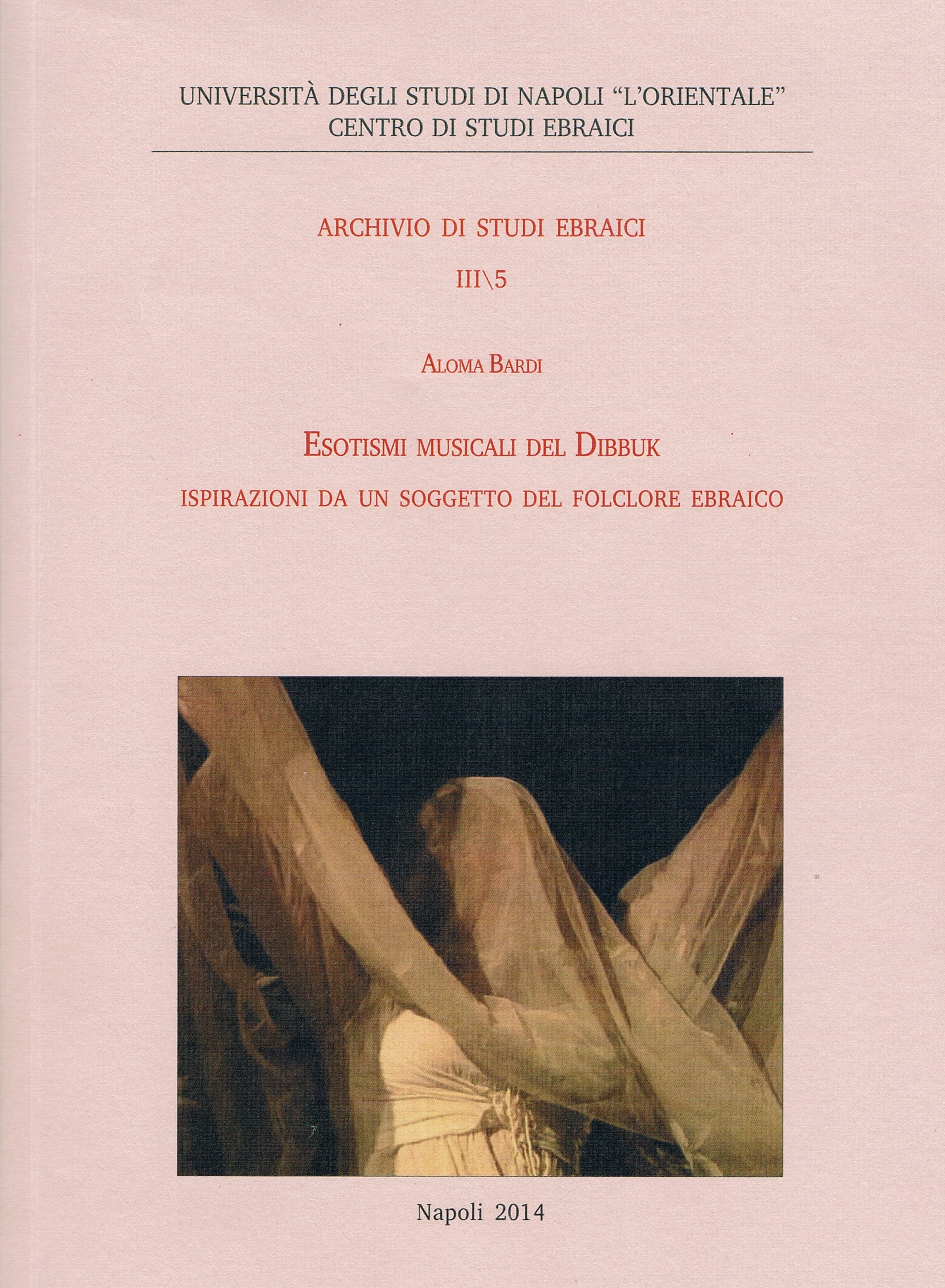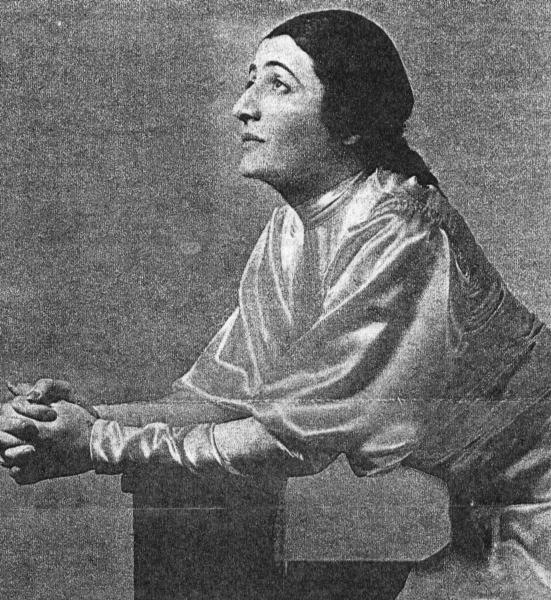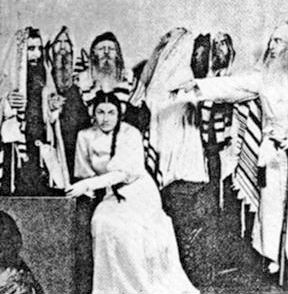
 (Rosa Raisa as Leah, courtesy Charles Mintzer)
(Rosa Raisa as Leah, courtesy Charles Mintzer)200 pp, Napoli 2014
ISBN 978-88-6719-056-0
ESOTISMI MUSICALI DEL DIBBUK
INSPIRAZIONI DA UN SOGGETO DEL FOLCLORE EBRAICO (In Italian)
By Aloma Bardi

 (Rosa Raisa as Leah, courtesy Charles Mintzer)
(Rosa Raisa as Leah, courtesy Charles Mintzer)
200 pp, Napoli 2014
ISBN 978-88-6719-056-0
Since the creation (1914) of S. Ansky's The Dybbuk, (Yiddish: Der dibuk oder tsvishn tsvey veltn) relating the story of a young bride possessed by a dybbuk —a malicious possessing spirit, believed to be the dislocated soul of a dead person— on the eve of her wedding, the play has been an inspiration for numerous classical music composers.
S. Ansky is a pseudonym for the Russian playwright Shloimi Rappoport. (1863 -1920)
The Dybbuk is considered a seminal play in the history of Jewish theater, and played an important role in the development of Yiddish theatre and theatre in Israel. The play was based on years of research by S. Ansky, who travelled between Jewish shtetls in Russia and Ukraine, documenting folk beliefs and stories of the Hassidic Jews.
Ansky died on November 8, 1920, and did not live to see the play professionally produced. As a tribute to Ansky, a production of the play was prepared by a troupe of actors from Vilna during the 30-day period of mourning after his death, and on December 9, 1920, the play opened at the Elyseum Theatre in Warsaw. It proved to be the Vilna Troupe's greatest success and in the twenties they toured all over Europe with the play.
In the book under discussion Aloma Bardi analyses and discusses all classical music compositions which were inspired by the play and its subject. Bardi is an Italian-born US music historian, musicologist and translator. She's a tireless champion of the music of Charles Ives and American classical music in general. Bardi explores in detail the several works dealing with the subject whether purely symphonic or vocal. Most devoted opera lovers or record collectors are familiar with Lodovico Rocca's work Il Dibuk, arguebly the most succesful of all efforts in adapting an operatic version of the play. Up until now this is the most in-depth and well-researched discussion of the Rocca's work. Tito Gobbi who sang in the opera in 1938 in Rome with Serafin conducting not only writes in his book on Italian opera that the work was a real triumph but also that Rocca was Jewish "and that he was retired from the directorship of the Turin conservatory". (1) Yet Bardi's research points out he was an Italian catholic and kept directing the Turin conservatory during the war years. Nevertheless the work was for a while boycotted.
 (Dibbuk finale with Rosa Raisa, courtesy Charles Mintzer)
(Dibbuk finale with Rosa Raisa, courtesy Charles Mintzer)
Il Dibuk is a three-act opera with a prologue, and it was first performed at La Scala Milan in March 1934. The London Jewish Chronicle was one Jewish journal that noted its appearance when it reported on the good reception it was given by the La Scala audience. After Milan, it played in Warsaw, Turin, and Rome and it then crossed the Atlantic to play in the United States but in English translation. It was first seen in Detroit for one night and Chicago for two on May 6, 7, and 8 in 1936 prior to its New York premiere at Carnegie Hall five days later. After New York, the opera was scheduled for performances in Washington, Philadelphia, Pittsburgh, Cleveland, St Louis, and Cincinatti.
In the US premiere (in English) it was Turandot creator Rosa Raisa who undertook the role of Leah. Interviewed by Louis Biancolli she said :" I love it! It is a very interesting part vocally and dramatically and I love it!" When Biancolli mentions Halévy's La Juive Raisa exclaims : " La Juive is pure Byzantine. No, the Dybbuk is really the only Jewish opera – and it is by a non-Jew. Rocca you know lived in Palestine for five years, taking in the colour and the atmosphere. He has caught the spirit of it. I feel it in every bar of the music." (2)
Other famous artists who performed Leah were Cesarina Valobra, Elisabetta Barbato, more recently Olivia Stapp and Augusta Oltrabella who created the role at la Scala. Famous tenors who performed Hanan were Frederick Jagel, Gino del Signore, Carlo Franzini, Augusto Ferrauto, Silvio Costa Lo Giudice, Giuseppe di Stefano, Carlo Bergonzi and Nicola Martinucci.
Extremely interesting and revealing is Aloma Bardi's research about Gerschwin and Alban Berg's interest in composing an opera on the Dybbuk. Gerschwin had an agreement with the Met –a copy of the contract is reprinted in the book - for an opera to be ready by april 1931. But Gerschwin as was Alban Berg were put checkmate by Rocca who got the rights first.
Another chapter is devoted to American composer David Tamkin whose English language Dybbuk was premiered at the New York City opera in October 1951 with Joseph Rosenstock conducting and Patricia Neway as Leah. Bardi's analyses the score in depth . Other works which are being discussed are the movie 'Der dibek (1937) which features Gershon Sirota singing a cantorial excerpt but where sadly enough only his back can be seen, Leonard Bernstein's ballet on the subject and Aaron Copland's Trio Vitebsk.
<
A concluding chapter is dedicated to more recent works based on Ansky's play with emphasis on Solomon Epstein's Yiddish opera The Dybbuk. An appendix is provided with a survey of all works based on the subject under discussion.
The book is illustrated with photos and several musical quotations to illustrate Bardi's analyses.
In footnotes Bardi also provides welcome biographical details of most people directly or indirectly involved with the composers and their creations.
The book should belong in every Jewish and/or music library and in the collection of everybody interested in the subject or in the operas based on the play.
(1) Tito Gobbi on his world of Italian opera, pp. 242-243
(2) Rosa Raisa by Charles Mintzer pp. 175 and further
Rudi van den Bulck